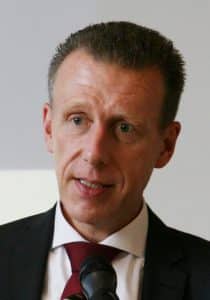
Diwald: I agree with one of the things you said in your editorial “Quo vadis DWV?”: The association has changed and will continue to do so. But I don’t concur with your assessment that we have strayed from our ideals or, as you put, from our “path.”
H2-international: Could you please elaborate?
Diwald: Gladly. DWV’s constitution reads: “The objectives of this Organization are: (A) to promote and prepare the widespread market introduction of hydrogen as an energy carrier mainly based on renewably sourced primary energy; (B) facilitate pathbreaking activities and coordination, such as when establishing a relevant regulatory framework; (C) contribute to an eco-friendly resolution of future energy supply difficulties and the conservation of our natural resources; (D) support science, research and climate protection activities in this field.”
Based on this constitution, the efforts by the DWV have had a significant impact on the ability of hydrogen technology to contribute to sustainable energy production. Our efforts, however, would have been in vain and not in line with the spirit of our constitution if we had not also called for a timely market introduction. This alone will allow us to achieve the objectives we set forth in our constitution and help us to find an eco-friendly solution to our energy problems and protect our natural resources.
H2-international: What exactly do you think are your tasks here?
Diwald: The focus and development of the energy industry is an issue that concerns everyone and requires politicians to act responsibly when designing a regulatory framework. It would be grossly negligent to leave development to market forces alone, considering the profit-focused strategy of private businesses and the subsequent risks to the overall economy, energy supply and the public health of future generations. By the way, all technologically advanced countries hold similar views and approach the issue accordingly.
Thus, it is essential that the representatives elected by the people direct the growth of the energy industry in a responsible manner while considering the interests of private businesses. The DWV believes its role is to make politicians aware of the benefits of introducing hydrogen technologies to the energy market as soon as possible. Additionally, professional lobbying in a positive sense has nothing to do with, as you say in your editorial, paying “for the implementation of one’s own interests.” Rather, we believe it is our responsibility to provide political decision makers with the facts about hydrogen output and core functionality in the energy industry in 2050. It is our contribution to the success of the energy transformation.
H2-international: What, then, is your primary goal?
Diwald: Our aim is to establish hydrogen technologies in the energy industry, since we are firmly convinced that an efficient energy transformation will only be possible with hydrogen as the energy source. It’s not about managing a balancing act, but about steady progress in activities and years-long efforts to find an efficient and effective solution for meeting the objectives of the German Hydrogen and Fuel Cell Association. We are certain that this is what our members expect of us and that they will continue to accompany and support us in the times ahead.


























Thank you very much for this interview, Mr. Geitmann.
However, the statements given do not REALLY show,
why the DWV was so “weak” in the last two decades,
to say it politely, and what the DWV actually wants in the future.